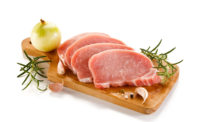Over the past decade, California’s voters and legislature have supported several measures mandating changes in common meat and egg production practices with consequences that extend far beyond the state’s borders. It began in 2008, when voters approved Proposition 2, a ballot initiative that prohibited California farmers from using gestation crates for hogs, confining veal calves in traditional hutches and keeping egg-laying hens in battery cages.
The passage of Proposition 2 put California’s pork, egg and veal producers at a competitive disadvantage with out-of-state and foreign producers; however, this was temporary. In 2010, the California legislature enacted Assembly Bill 1437, which protected California’s egg farmers by prohibiting the sale of shelled eggs from hens reared in out-of-state housing that did not meet Proposition 2’s standards. In November 2018, voters approved Proposition 12, a ballot initiative that prohibits the sale of fresh cuts of pork and veal in California that do not meet the animal-housing requirements imposed on California’s farmers in Proposition 2. The law is anticipated to go into effect by mid- to late 2020.
Given the buying power of California’s consumers, Proposition 12 is effectively setting standards for pork and veal producers in other states and in foreign countries. This forces pork and veal producers to either make significant investments in their facilities or abandon the prospect of making any sales to California.
Proposition 12 is premised on shaky legal grounds. Although California’s government has the right to deem certain animal-raising practices within their borders unlawful, the state has no jurisdiction over animals outside of the state. Instead, the proponents of Proposition 12 have made bare assertions that common confinement methods result in meat that threatens the health and safety of California consumers and increases the risk of foodborne illnesses.
On Oct. 4, the North American Meat Institute (NAMI) filed a federal lawsuit in the Central District of California seeking to enjoin California from implementing Proposition 12. The lawsuit alleges that Proposition 12 violates the U.S. Constitution’s Commerce Clause because it discriminates against out-of-state producers, distributors and sellers of pork and veal. NAMI points out the primary purpose of Proposition 12 is to level the playing field for California’s farmers by erecting impermissible protectionist trade barriers. NAMI asserts California has not demonstrated, through scientific evidence, that it has a legitimate consumer health and safety concerns pertaining to how animals are housed outside of the state.
NAMI also asserts that California has engaged in unconstitutional extraterritorial regulation by imposing restrictions on out-of-state producers and that its ban on non-compliant pork and veal burdens interstate commerce in meat, meaning consumers pay higher prices for pork and veal.
It will take several months (or even longer) for this case to be resolved. The lawsuit raises issues that will have consequences that extend beyond California’s law. For instance, Massachusetts’ voters recently passed a ballot initiative that would have similar effects on the marketplace as Proposition 12. Courts are generally deferential to states that enact measures designed to protect consumer health and safety. But it is apparent that leaving these types of laws in place would allow states to create a patchwork of regulatory systems that was not intended under the Constitution. NP




Report Abusive Comment